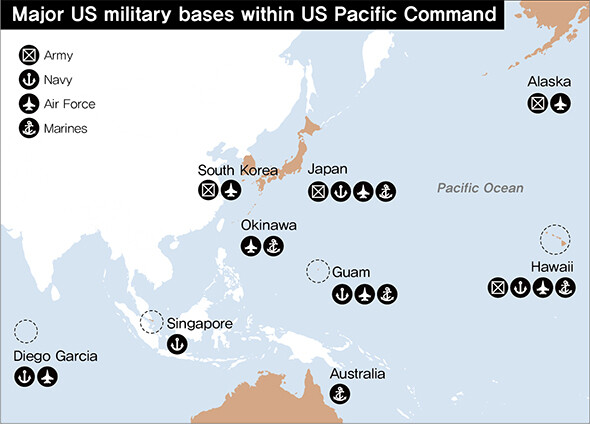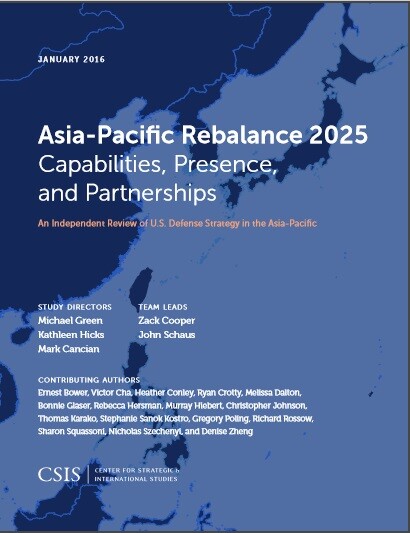hankyoreh
Links to other country sites 다른 나라 사이트 링크
US think tank CSIS recommends THAAD deployment on the Korean Peninsula

A prominent US think tank recently published a report explicitly recommending the deployment of a Terminal High Altitude Area Defense (THAAD) system on the Korean Peninsula to Washington.
The Center for Strategic and International Studies (CSIS) also claimed a strong likelihood that the current regime in North Korea will collapse.
While the CSIS is widely recognized as a cradle for conservative security experts in the US - with a number of its Asia specialists having strong backgrounds on and sympathies toward Japan - the report’s recommendations are expected to generate some controversy because of their potentially large impact on the policy decisions of the US and other governments.
Titled “Asia-Pacific Rebalance 2025,” the report was published on Jan. 20 and commissioned by the US Department of Defense. In it, the importance of a THAAD deployment on the Korean Peninsula is stressed as a means of strengthening regional missile defense capabilities under the Asia-Pacific “rebalancing” strategy.

“While the PATRIOT [Air Defense Missile System ] defends against lower-tier threats, the THAAD system provides greater reach to strike long-range missiles earlier in flight, and is the only missile defense system with the ability to intercept threats both inside and outside the atmosphere,” the report noted as advantages of THAAD.
“The ROK military has expressed interest in developing an indigenous THAAD-like system, but U.S. experience with these types of systems suggests a multi-decade effort would be required to develop and deploy such a missile defense system,” it continued.
The report did not include any mention of critics’ arguments that THAAD radar is poor at detecting decoys, and that the system has difficulties intercepting missile targets due to their irregular movements.
The report also noted renewed research by the US Missile Defense Agency (MDA) on the possibilities of the THAAD-ER (extended range) system with an expanded interception area. It was the first mention of the new interception missile, which could defend an area nine to 12 times larger than the current THAAD system.
The report’s mention of THAAD-ER as a “means to defend against hypersonic systems” could be taken as a reference to hypersonic missiles reportedly under development by China.
Regarding North Korean leader Kim Jong-un, the report states that the current leadership in Pyongyang “is incapable of reforming and opening up to market transactions with the outside world.”
The possibility of a North Korean collapse was also mentioned as a major security risk.
“[M]aintaining the status quo is not sustainable in the long term,” the report said, citing a growing number of refugees.
“North Korea . . . presents an instability risk, with the potential for a rapid collapse of centralized state control,” it concluded.
In addition to conflicting with South Korea’s conclusion that the number of refugees has fallen under the Kim regime, the predictions also run counter to those of a US Congressional Research Service report on North Korea-US relations published on Jan. 15, in which Kim was described as having apparently solidified his leadership.
While CSIS presented the report as an “independent” assessment, its content appears to reflect the interests of the US Department of Defense and defense industry, which would like to see an increased defense budget.
A financial report published in 2013 showed business (32%) and the government (19%) to account for a majority of CSIS revenues, not including those of its foundation (29%). Members of its board of trustees include the chairmen of Boeing and ExxonMobil. Many of its projects are studies commissioned by the Pentagon.
Also characteristic of CSIS reports are their emphasis on the China threat and defense of US and Japanese interests. In 2014, the New York Times reported that the institute had received at least US$1.1 million in support from the government-affiliated Japan External Trade Organization (JETRO) over a four-year period.
By Yi Yong-in, Washington correspondent
Please direct questions or comments to [english@hani.co.kr]

Editorial・opinion
![[Editorial] Yoon must halt procurement of SM-3 interceptor missiles [Editorial] Yoon must halt procurement of SM-3 interceptor missiles](https://flexible.img.hani.co.kr/flexible/normal/500/300/imgdb/child/2024/0501/17145495551605_1717145495195344.jpg) [Editorial] Yoon must halt procurement of SM-3 interceptor missiles
[Editorial] Yoon must halt procurement of SM-3 interceptor missiles![[Guest essay] Maybe Korea’s rapid population decline is an opportunity, not a crisis [Guest essay] Maybe Korea’s rapid population decline is an opportunity, not a crisis](https://flexible.img.hani.co.kr/flexible/normal/500/300/imgdb/original/2024/0430/9417144634983596.jpg) [Guest essay] Maybe Korea’s rapid population decline is an opportunity, not a crisis
[Guest essay] Maybe Korea’s rapid population decline is an opportunity, not a crisis- [Column] Can Yoon steer diplomacy with Russia, China back on track?
- [Column] Season 2 of special prosecutor probe may be coming to Korea soon
- [Column] Park Geun-hye déjà vu in Yoon Suk-yeol
- [Editorial] New weight of N. Korea’s nuclear threats makes dialogue all the more urgent
- [Guest essay] The real reason Korea’s new right wants to dub Rhee a founding father
- [Column] ‘Choson’: Is it time we start referring to N. Korea in its own terms?
- [Editorial] Japan’s rewriting of history with Korea has gone too far
- [Column] The president’s questionable capacity for dialogue
Most viewed articles
- 1Months and months of overdue wages are pushing migrant workers in Korea into debt
- 2At heart of West’s handwringing over Chinese ‘overcapacity,’ a battle to lead key future industries
- 3Seoul getting its first-ever vertical farm
- 4Fruitless Yoon-Lee summit inflames partisan tensions in Korea
- 5Trump asks why US would defend Korea, hints at hiking Seoul’s defense cost burden
- 6[Editorial] Yoon must halt procurement of SM-3 interceptor missiles
- 7[Editorial] New weight of N. Korea’s nuclear threats makes dialogue all the more urgent
- 8Dermatology, plastic surgery drove record medical tourism to Korea in 2023
- 9Under conservative chief, Korea’s TRC brands teenage wartime massacre victims as traitors
- 10Gangnam murderer says he killed “because women have always ignored me”